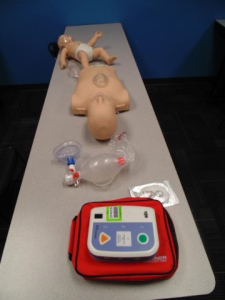Posted by Brenda Berdahl on May 21, 2021 in CPR Regulations
Chiropractors in Colorado are required to always maintain a current, valid CPR certification. But did you know that the time spent maintaining your CPR certification can be applied toward your total continuing education hours required by the state board?
This roughly mirrors the CPR requirements for dentists in Colorado, except that dentists have a 2-hour maximum of CPR/BLS course time that can be applied to their continuing education requirements—chiropractors don’t have this maximum cap, however it’s ultimately a wash because CPR renewal courses last about two hours anyway!
In today’s post, we’ll take a look at a few refresher items regarding continuing education for chiropractors in Colorado, what exactly you need to do to establish or renew your CPR certification, and what it’s like taking a course at CooL Compressions CPR. Whether you’re a longtime practicing chiropractor or you’re a student looking ahead to see what will be required of you to maintain your active license, this is all critical information to understand.
Let’s begin:
Here’s What You Need to Know About Continuing Education Requirements for Chiropractors in Colorado
The Board of Chiropractic Examiners in Colorado have laid out a comprehensive document about continuing education for chiropractors at the the Colorado Division of Professions and Occupations (DPO) website. Learn about continuing education for chiropractors in Colorado here.
The broad strokes are thus: active licenses for chiropractors in Colorado have a period of two years before renewal; during that two-year period, the practicing chiropractor is required to complete a minimum of 30 hours of continuing education.
There are, however, a couple of noteworthy exceptions. If you’re a new chiropractor and you’ve been actively licensed for 12 months or less before the first renewal of your license is required, you don’t have to do any continuing education for that renewal period. Having said that—and this is where things can get confusing—if your CPR/BLS certification expires during that period, you are required to renew it.
In other words, all actively licensed chiropractors in Colorado must maintain a current CPR certification regardless of their continuing education requirements.
Additionally, chiropractors who have been actively licensed for longer than 12 months before their first license renewal period (e.g., you’re new to the profession and you’ve been at it for, say, 18 months), these practitioners are only required to fulfill 15 hours of continuing education. A CPR renewal course will apply to these 15 hours the same as they would during a regular license renewal period.
For the specifics of what kind of continuing education is necessary, consult with the DPO website. For now, we’ll focus on the CPR certification requirements as that’s our specialty here at CooL Compressions.
CPR/BLS Certification Requirements for Chiropractors Explained
The DPO requires actively licensed Colorado chiropractors to maintain a CPR certification which meets the standards of a health provider level. To meet this level, the certification must be issued by an organization meeting the standards laid out by the American Heart Association or a similarly recognized organization (either based out of the United States or internationally). The courses here at CooL Compressions CPR follow the standards as defined by the American Heart Association.
A CPR certification is valid for up to two years before it needs to be renewed, which lines up with the two year licensing period for Colorado chiropractors. In the next section, we’ll look at the differences between getting your first CPR certificate, a renewal, and what to do if your CPR certification has expired.
Getting Your First CPR/BLS Certification or Attending a Certification Renewal Course
If you’ve never been attended a CPR/BLS certification course, you’re required to take what’s called the full course. This is a longer, more detailed course that teaches you everything you need to know about this live-saving skill set.
If you already have a CPR certification but you need to renew it before it expires, you can simply attend a shorter, condensed renewal course at CooL Compressions CPR. These courses help you refresh your knowledge, confirm that your skills are up-to-date with the latest practices, and allow you to prove to governing bodies and clients that your certification is current.
If you had a CPR certification but it expired, you aren’t eligible to attend a renewal course. If your certificate is expired, you’re required to take the full CPR/BLS certification course again. This is why it’s so important to always renew on time! We’ll explore that topic in more detail below.
Why it’s Important to Reserve Your Seat for CPR Certification Courses as Soon as Possible
Whether you’re getting your CPR certificate for the first time or you need to attend a renewal course, it’s important that you reserve your seat with us as soon as possible by visiting our training schedule.
This is especially true if you need to attend a renewal course. While it’s true that renewal courses are more compact than the full course, they tend to fill up very quickly—especially near the end of the month when everyone else needs to get their certificates renewed as well. As you learned above, if your CPR certificate expires, you won’t be eligible for a renewal course. To save yourself time and money, the best thing to do is always to reserve your seat for a renewal well in advance.
Get Started With a CPR/BLS Course at CooL Compressions CPR
If you’re ready to attend a course at CooL Compressions CPR and get certified or renewal your already existing certification, it’s easy to get started. Simply visit our training schedule, find a date and time that works for you, and click on it to reserve your seat. Answers to our most commonly asked questions can be found on our FAQ page. If you have any further questions, you’re welcome to call us at 720-609-2972.


